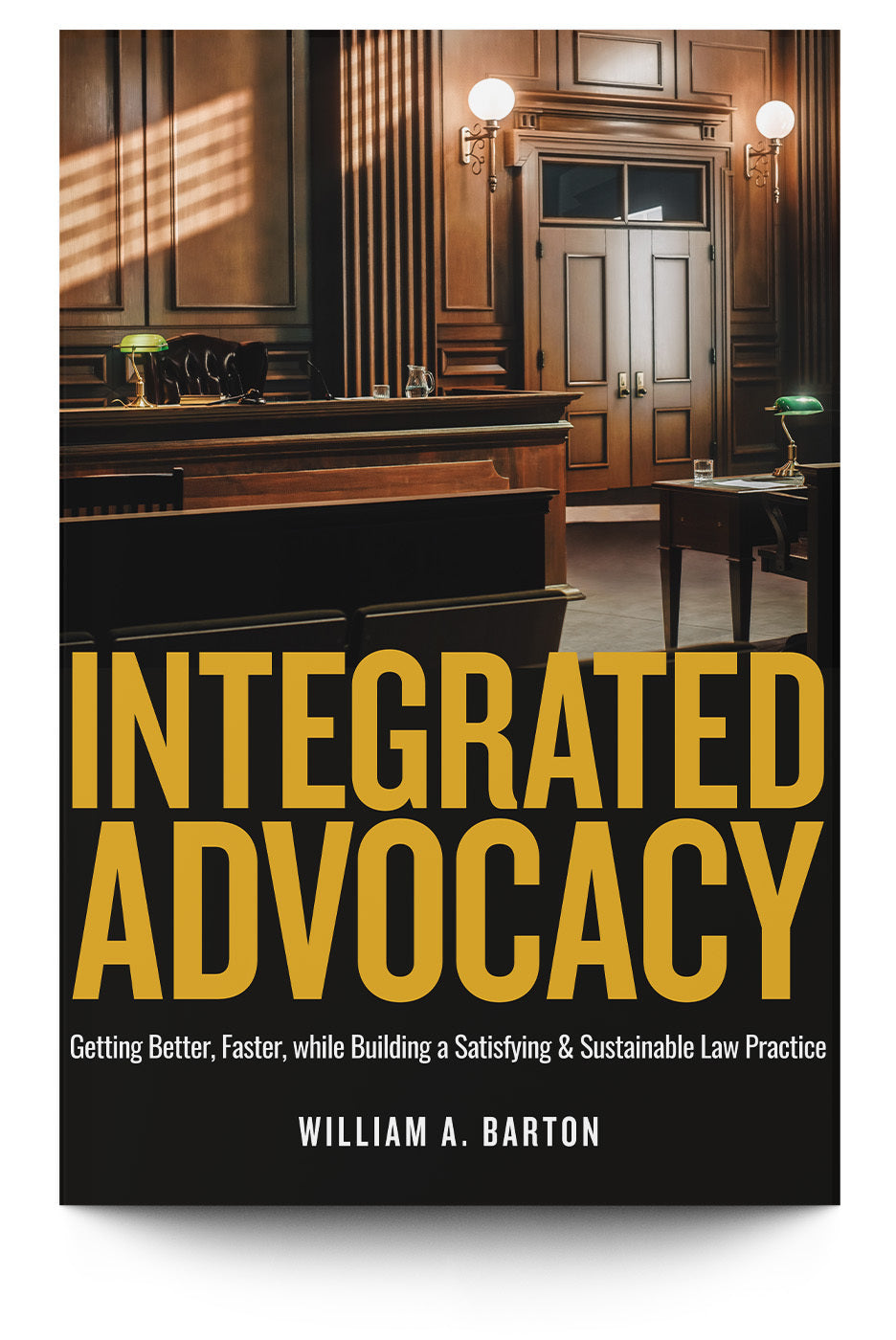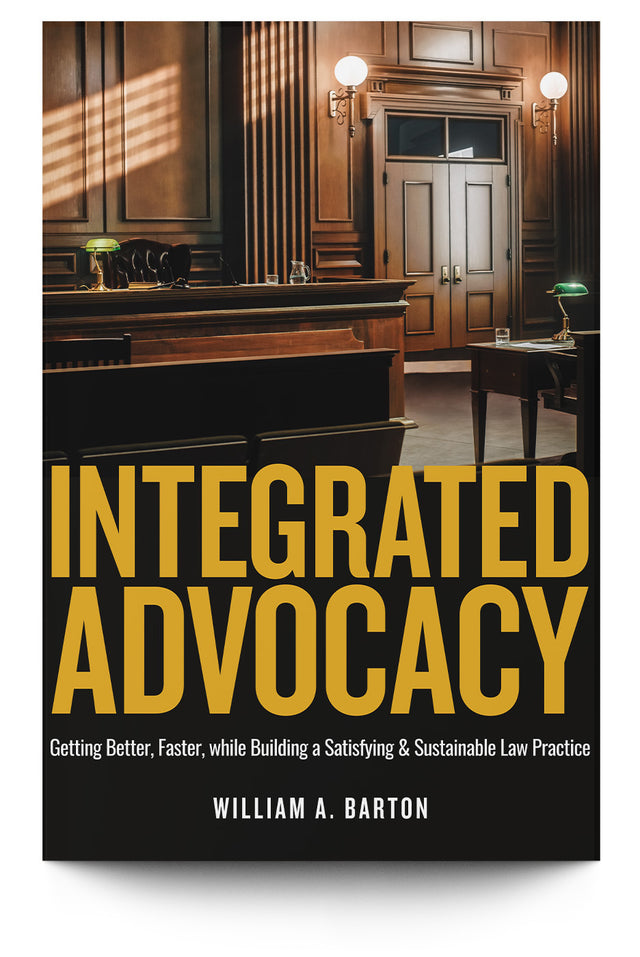Description
Description
After five hundred trials spanning over five decades, attorney William "Bill" Barton has seen—and learned—a lot.
Barton is widely regarded as a foremost legal expert on the nuanced subject of psychological injury and is the bestselling author of Recovering for Psychological Injuries (now in its third edition). He was the first attorney to bring a landmark case to trial against the Boy Scouts of America and later went on to sue the Vatican for sexual abuse by the clergy. These watershed cases made a name for the Oregon native—and formed the cornerstone of a career punctuated by powerful verdicts.
In Integrated Advocacy, Barton takes 50 years of hard work and innovation trying nearly every kind of case—from medical malpractice and auto accident to maritime, sex abuse, premises, aviation, and more—and condenses them into a successful approach to practicing law. His wisdom covers a range of issues, from trying cases to sustainably running a law firm. With ideas both practical and philosophical, Barton explores important principles of trial advocacy before expanding on what Rick Friedman calls “an encyclopedia of the types of problems we all face as trial lawyers—and creative solutions to those problems.”
Divided into nineteen chapters, Integrated Advocacy begins with the issues many lawyers face as they build and pursue their careers, from different kinds of trial work to what often makes or breaks a law practice. Beyond the broader, career-minded conversations, Barton draws from his past work as both a trial lawyer and judge to offer practice-changing insights on a range of topics:
- Why it’s vital to build credibility—and how to do it
- The importance of going to trial
- How to empower the jury
- The elements of an effective trial story
- Different cross-examination strategies
- How to frame and argue damages
- Advice for dealing with experts
- How to navigate mediation
- The nuts and bolts of running a law firm
- And more
Ultimately, Barton ends with a detailed discussion on how to evaluate your cases and when and how you should refer a case out.
As Howard Nations puts it, “Bill is equal parts trial lawyer and legal educator, and he excels at both.” Don’t miss your opportunity to learn from the legal legend Rick Friedman dubs "the wisest trial lawyer [he has] ever met.”
Author
Author
Details
Details
Paperback: 250 pages; 1st edition; ISBN: 978-1-951962-61-6
Publisher: Trial Guides LLC
Table of Contents
Table of Contents
Foreword by Rick Friedman
Foreword by Howard Nations
Introduction
- What Integrated Advocacy Offers You
- Being a Jury Trial Lawyer
- Thoughts on Losing and Best Practices After a Loss
- What Motivates You?
- Constructing Your Life Story
- Different Types of Courtroom Work
- Differences Between Criminal Defense and Plaintiffs’ Personal Injury
- Heuristics and Biases
- (Pre)Trial Checklist
- Legal Foundations and Magic Words
- Different Types of Cross-Examination
- Framing Your Damages
- Meditation From the Plaintiff’s Perspective
- On Personal Authenticity
- The Craft of Storytelling
- The Ubiquitous Presence of Money
- Running a Law Business
- Evaluating Cases
- When and How to Refer Your Cases
Recommended Reading
About the Author
What Legal Leaders Are Saying
— Paul Luvera, past president of the Inner Circle of Advocates and Washington State Trial Lawyers Association, a member of the American Board of Trial Advocates, and a fellow of the American College of Trial Lawyers, the International Academy of Trial Lawyers, and the International Barristers SocietyThis book has been written by an acknowledged trial master with years of successful trial experience to back it up. Barton shares his trial wisdom in this book with clear and understandable advice proven by his own professional successes. His advice is practical and within every trial lawyer’s ability to adopt and apply for more successful trial practice.
— Howard Nations, inductee of the Trial Lawyer Hall of Fame, awarded AAJ’s Lifetime Achievement Award, and past president of the Texas Trial Lawyers AssociationBill’s depth of experience in trial and teaching is on display in the major portion of the book in which he discusses a wide variety of trial-related subjects such as framing your damages, effective damages proof and arguments, elements of an effective trial story, and the ubiquitous presence of money, among many others. [...] In summary, a great trial lawyer with finely honed teaching skills has written an excellent book designed to inspire the reader to become both a better person and a more skillful lawyer. I recommend that you buy it, read it, enjoy it, and tell your friends about it.
— Emily Templeton, Oregon Attorney for the Underdog, past Barton Integrated Advocacy Bootcamp attendeeAs a new plaintiff's lawyer, this book is essential to mastering the intricacies of effective trial advocacy, personal authenticity, framing damages, storytelling, and various aspects of courtroom work. The inclusion of chapters on criminal defense, plaintiffs' personal injury, legal foundations, and cross-examination gives a holistic approach to trial practice. Overall, this book is a must-read, well-rounded guide for new and seasoned trial lawyers.
— Ron K. Cheng, attorney at Cheng Law, LLC and Barton Boot Camp AttendeeWhile many legal texts teach you techniques on how to be a more skillful lawyer, and this book does, it also reminds you to listen to your better angels and not lose yourself along the way. Bill Barton’s book is practical and aspirational, filled with valuable insights on advocacy, the business of law, and personal growth. Wisdom for both the practice of law and the practitioner.
— Eric Fong, Public Justice board member and Trial Lawyers college instructorIn the history of legal giants, Bill Barton holds profoundly unique wisdom and insight. Reading Integrated Advocacy, I can hear Bill’s voice crack as he digs deep for the meaning he so eloquently expresses. Bill pursues creative excellence and provides legal savvy in his exploration of legal and trial thoughts. His teachings cannot be overstated both in his epic and intense boot camp and his writings. With dedication to our profession and the students of the profession, Bill’s most recent book passes on generational wisdom and ancestral knowledge that must be preserved. His first masterpiece, Recovering for Psychological Injuries, was the first legal self-help book I read, and Integrated Advocacy could easily be the last.
— John Coletti, awarded Oregon Trial Lawyers Association’s Distinguished Trial Lawyer of the Year and member of the Inner Circle of AdvocatesBill Barton has played many roles in my career: father figure, mentor, friend, and occasional therapist. I’m certain that there are hundreds of Oregon lawyers who share the same experience. I was honored to attend the inaugural Barton Boot Camp in 2005. It was there that I learned the incredible amount of time and energy Bill dedicates to studying, improving, and teaching every aspect of trial advocacy and what I call the holistic practice of law. This book is a continuation of Bill’s decades-long passion and commitment to improving and teaching trial advocacy, not just for the betterment of trial lawyers and their clients, but also for the families and loved ones who support all of us in our journey as trial lawyers. I consider it a must-read.
— Randi McGinn, New Mexico trial lawyer and first woman president of the Inner Circle of AdvocatesLawyers are notoriously bad business people. They can tell a story, charm a jury, and write a killer brief, but when it comes to financial records… well, many went to law school because they were bad at math. Bill Barton’s book, Integrated Advocacy, is the solution for those who are struggling with the business side of the practice of law. His chapters on “Running a Law Business” (with financial nuts and bolts) and “Evaluating Cases” will begin to make or save you money the day after you read them. Based on years in the business, Bill’s insights into the work we do, finding and being your authentic self, and how to become a success both inside and outside the courtroom are invaluable for new lawyers and those who have been doing this for years.
— Hon. Paul J. De Muniz (ret.), former Oregon Supreme Court Chief Justice and Distinguished Jurist in Residence at Willamette University College of LawOn the pages of this book are the recorded thoughts of a brilliant and innovative trial lawyer who has achieved justice for his clients, in and out of the courtroom, for more than fifty-one years. The book offers a treasury of advice and insight into pre-trial and trial practice, borne of Bill’s vast experience, wisdom, and dedication to the improvement of his craft and the legal profession. However, and perhaps of equal importance, the advice and wisdom set out in the book is infused with Bill’s overriding commitment to humanistic values. The trial practice and life circumstances of every lawyer, from beginner to courtroom veteran, will benefit from reading this book and doing so regularly.
— Nicholas Rowley, has won over $1 billion in settlements and verdicts for injured plaintiffs and coauthor of Trial by HumanThere are a handful of lawyers who have had tremendous influence over my life and career, and Bill Barton is one of those wonderful humans. I have always learned so much from spending time with him. In our profession, there is no one I have ever met who turns on the flow of wisdom and advice like Bill. So, whenever I get to spend time with him, I try to be a sponge and soak it all in. The truth though, is that I can’t. I try to receive all the gifts of wisdom Bill has to give, but there just isn’t enough time or bandwidth. Important gifts of wisdom spill over and get lost. Not anymore though! This wonderful book makes me smile because so much of Bill’s wisdom has been written down. This book is a precious gift. Thank you, my dear friend, so many of us love you so much. This book is spectacular!
— Rick Friedman, past president of the Inner Circle of Advocates and coauthor of Rules of the RoadAfter more than fifty years toiling in the fields of the courtroom, [Barton] shares his harvest of insights on topics ranging from how to set up and run a law office to the different styles of cross-examination. There is more good advice for trial lawyers in this book than in any other book I can think of. [...] Reading this book is like sitting and talking with the perfect mentor: someone who has seen it all, lived it all, and thought long and hard about it all; someone who understands how difficult our jobs are, the complexity and stress of the decisions we have to make and who is trying to help you think through your own approaches to practicing law rather than telling you what to do.





